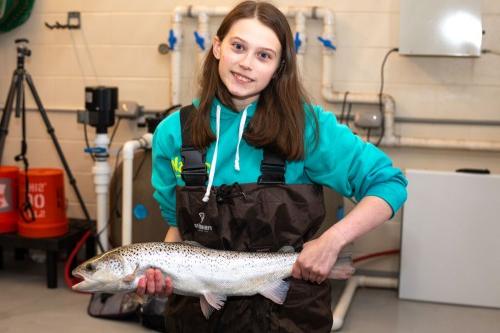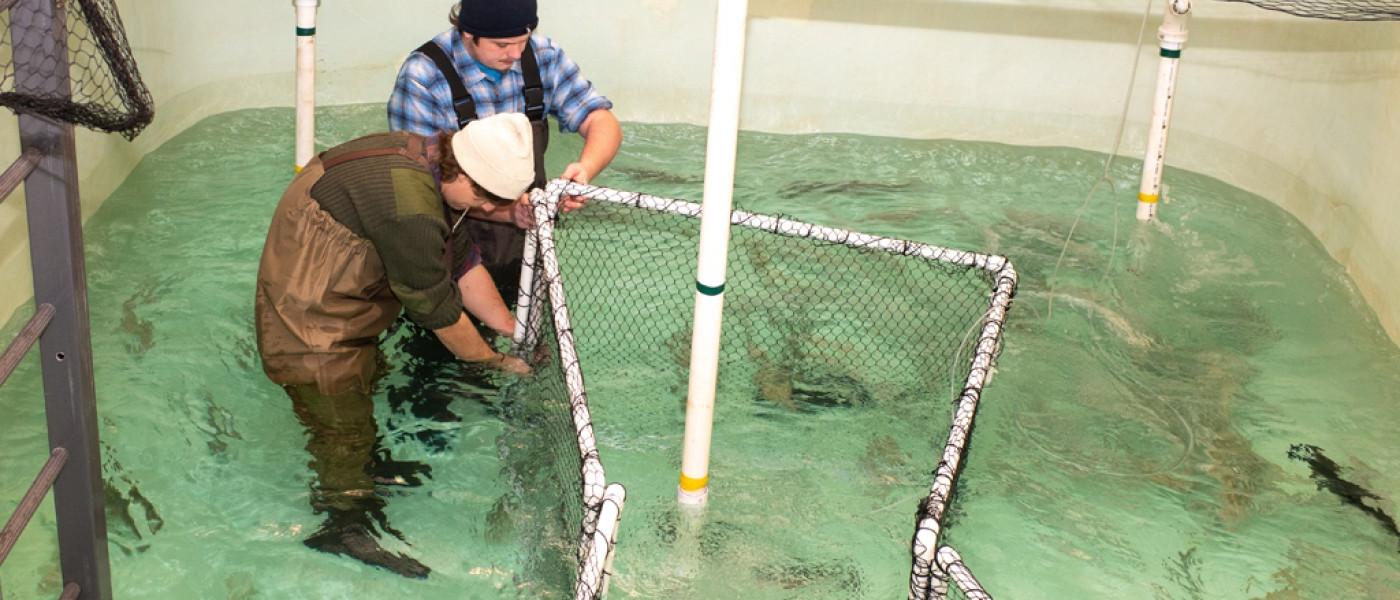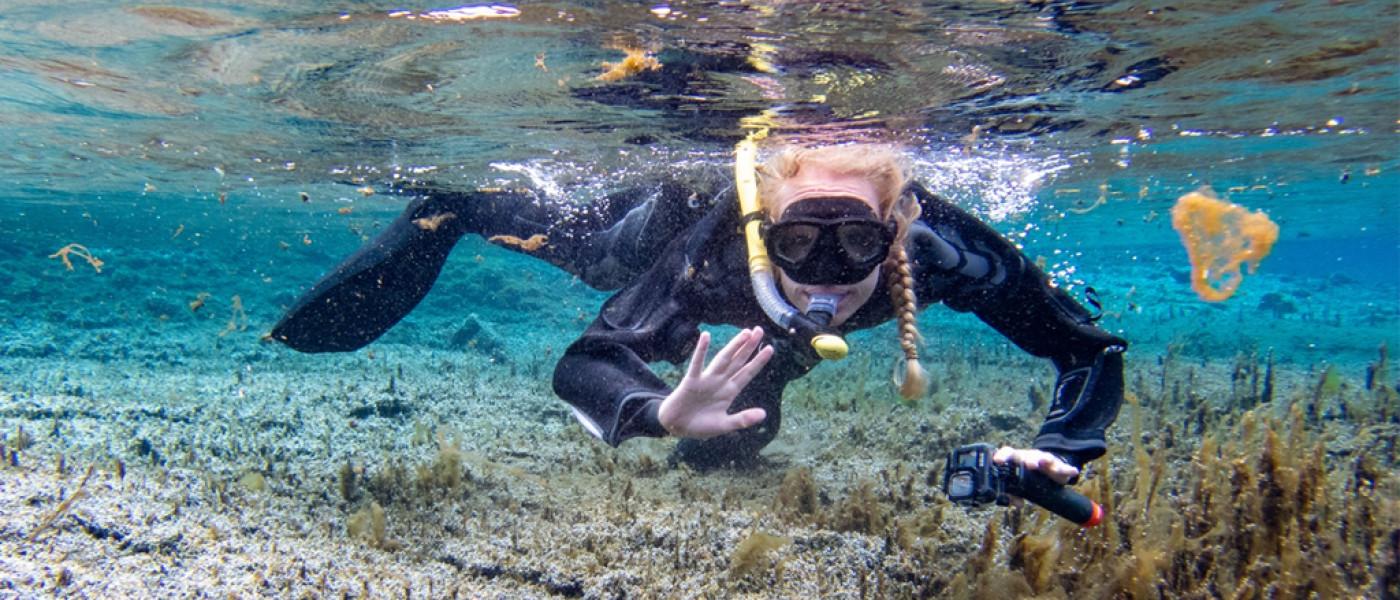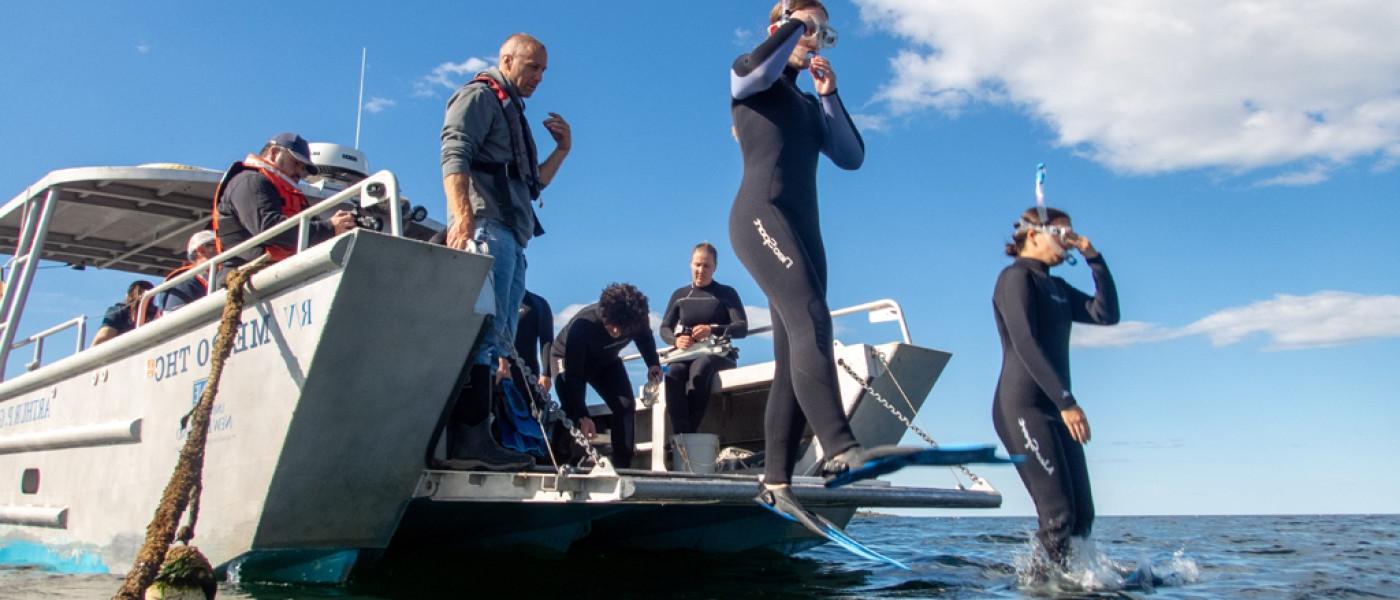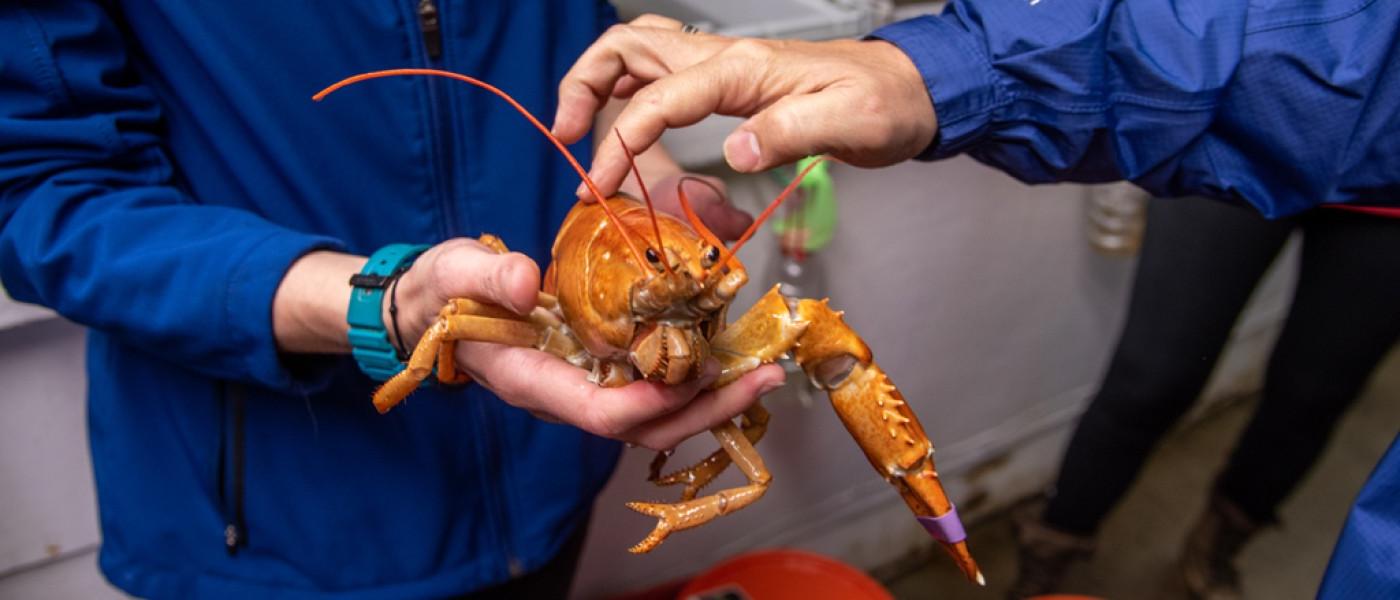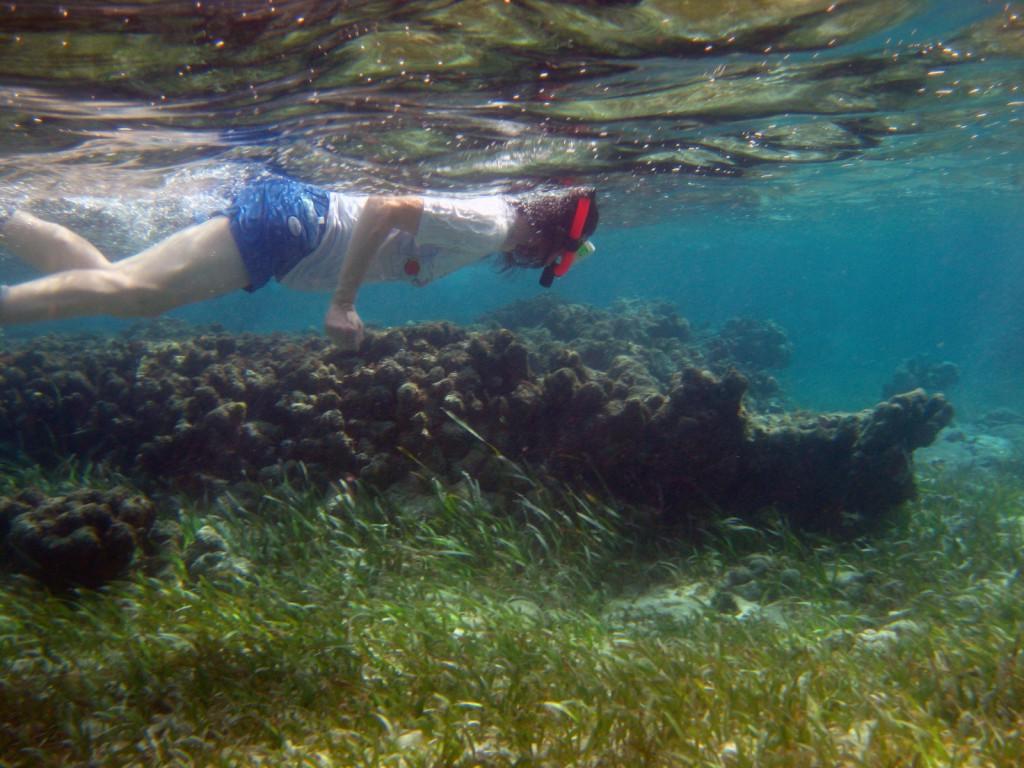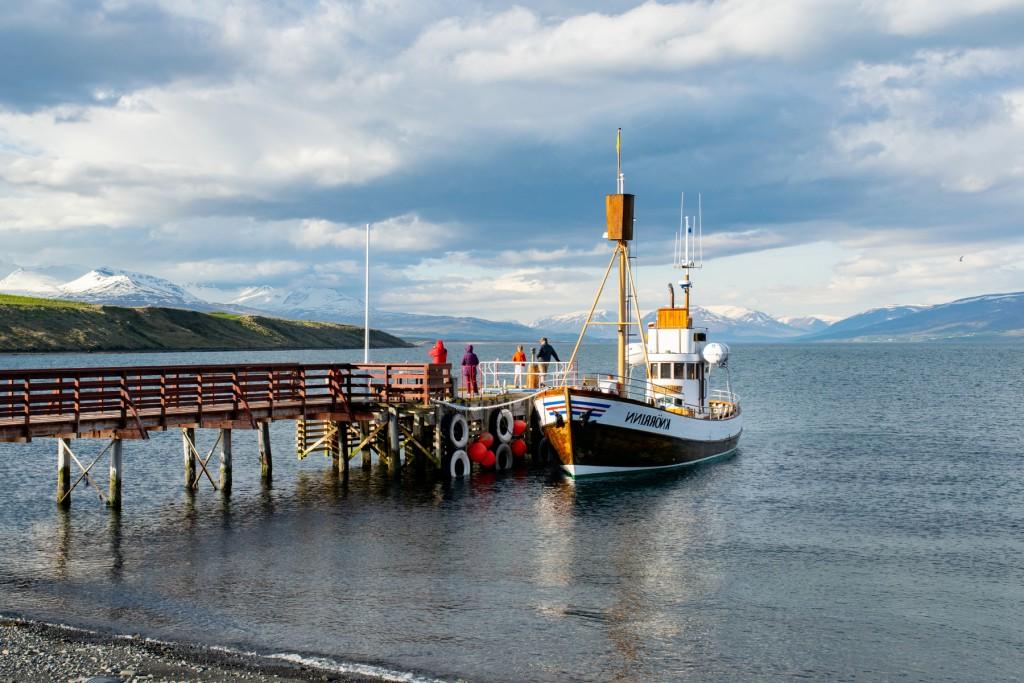Dive into the Exciting Marine Sciences Degree at UNE
Launch your career with the sea at UNE, recognized as one of the best schools for marine biology in the nation. UNE provides the expert faculty, supportive community, and inspiring facilities to prepare you for a rewarding life working with — and for — the ocean.
You’ll study ocean life on our coastal campus, located where the Saco River meets the Atlantic. Imagine walking just steps from our cutting-edge Marine Science Center to our campus dock, boarding a research vessel, and steaming to our private island or off into the Gulf of Maine. Through it all, you’ll be able to work hands-on with scientific and nautical equipment — gaining valuable career skills.
Accolades for UNE Marine Sciences
Best Colleges for Marine Biology
College Magazine, 2023
Best Marine Biology Degrees
College Choice, 2023
Best Marine Biology Colleges
Biology Explorer, 2023

Why UNE for Your Degree in Marine Sciences
- Live and learn on the coast of Maine — just steps from the ocean
- Amazing facilities, from lab technology and aquariums in our Arthur P. Girard Marine Science Center, to our three research vessels and University-owned, private island
- Join a community of students and faculty who share a passion for the sea
- Participate in real research with faculty, on the water and in the lab
- UNE’s regional and national partnerships create opportunities for exciting internships in every aspect of marine science
- UNE is ranked nationally in the top 10 colleges for Marine Sciences
Flexible Foundation for Your Marine Career
The first-year curriculum of UNE’s B.S. in Marine Sciences degree program sets the foundation for other marine majors. You can launch your college career with this major, knowing that UNE faculty will mentor you in changing to another marine major in a way that keeps you on track.
CHECK OUT THE UNE Marine ScienceS COMMUNITY
What Will You Study? Marine Sciences Degree Curriculum Overview
Examples of Available Courses
The following are just some examples of the exciting courses that the Marine Sciences major offers:
- Underwater Robotics
- Experimental Animal Physiology
- Biology of Sharks, Skates, and Rays
- Marine Mammal Policy
- The Scientific Basis for Global Climate Change
- Polar Biology
- Oceanography
Marine Sciences Degree Tracks
As a Marine Sciences degree seeker, you may choose one of two tracks:
- The Marine Biology track focuses on marine organisms and the ecosystems upon which they depend.
- The Oceanography track focuses on the physical, chemical, and geological basis of biological life in the ocean.
Double Major in Marine Sciences and Applied Mathematics
The Marine Sciences and Applied Mathematics double major program gives you the opportunity to earn two degrees in four years: a B.S. in Marine Sciences and a B.S. in Applied Mathematics. You’ll learn computer-based mathematical modeling and statistical analysis to address such problems as managing fish populations. The double major will position you for a variety of careers in fields like marine resource evaluation and sustainability, species population dynamics, and data systems management.
You'll spend the first two years completing fundamental math and marine science coursework, leading to an applied student research project in your senior year.
Study Marine Sciences on the Coast of Maine
Career Paths for Marine Sciences Grads
With the knowledge you gain from coursework, the critical thinking skills you develop through research, and the life skills you acquire from internships, you’ll be well on your way to an exciting career in the marine sciences.
Our graduates have pursued many fascinating careers, including:
- Laboratory Technician
- Fisheries Observer
- Marine Biology or Oceanography Researcher
- Animal Caretaker at Zoos and Aquariums
- Environmental Educator
- Animal Trainer
- Conservation Advocate
- Natural Resource Manager
- Veterinarian
- Commercial Diver
Marine Biology Degree Career Advising
Whether you have a specific career goal in mind or a vague idea of the field that interests you, Career Advising is here to help you plan your next step.
Explore Our Marine Science facilities
Beyond our close-knit community of students and world-class faculty who share a passion for marine ecosystems, small class sizes, and student-centered research and education communities, our incredible facilities help us rank as one of the best schools for marine biology.
Experiential Learning in Marine Sciences
Marine Sciences offers constant hands-on interaction in a variety of marine ecosystems and environments from the watershed to the river, from the estuary to the ocean. Through internships, field research, and experiential learning, you don’t just learn marine science — you do marine science.
Internships in Marine Sciences
Students can pursue a wide array of enriching internship opportunities, enabling you to study ocean life at institutions including:
- National Oceanic and Atmospheric Administration (NOAA)
- Gulf of Maine Research Institute
- New England Aquarium
- Bigelow Laboratory for Ocean Sciences
- Various Aquaculture Farms and Fisheries
- Wells National Estuarine Reserve
Marine Biology Research on the Maine Coast
Join Marine Sciences student Andrew Davidson for seine netting research on the Gulf of Maine.
Shark Detection Buoy Deployment in Maine
Join UNE Marine Science faculty and students as they deploy a real-time shark detection buoy in Saco Bay.
Research Opportunities in Marine Sciences
Undergraduate research is an essential part of our programs no matter which major you choose. All students conduct research in the field through their regular coursework beginning in their freshman year, with additional opportunities to gain experience through faculty labs and multi-institutional initiatives.
Research Fellowships in Marine Sciences
In addition to lab classes and faculty lab positions, UNE provides pathways for students to obtain research experience through fellowships from partners and programs including Pratt & Whitney, Bristol Seafood, SEANET, and the Summer Undergraduate Research Experience.
Marine Sciences Research Areas
The field of Marine Science is as broad and diverse as the vast oceans that cover most of our planet. At UNE, we touch upon all facets of marine science with special focuses in the following areas of research.
Applied Marine Technology
Applied marine technology is a crucial marine programs research area that cuts across all others. Robotics, research vessels, remote and autonomous underwater vehicles, environmental monitoring, and modeling are all vital tools that enable modern marine research to occur. Researchers in this area are interested in innovations in and novel applications for marine technology.
Food from the Ocean
With a global human population headed towards 10 billion by 2050, understanding the interactions between the ocean and what we eat is more important than ever. Our location on the coast of Maine has a deep heritage and connections to the people and communities who have harvested food from the sea, and the ecosystems that provide it. We have robust research and education programs in this focus area including fisheries science and management, ecological aquaculture, marine entrepreneurship, migration of highly migratory species, and food web ecology.
Biology of Marine Organisms
Our Marine Programs faculty and professional staff conduct a wide range of research in the areas of biology and ecology of marine organisms. This research area is very broad and ranges from marine genetics to the migration patterns of large animals like sharks, seals, and whales. From seaweed to sharks — plankton to pinnipeds (seals!) our team covers it all.
Human Impacts on the Ocean
Evidence of human impact on the ocean is everywhere, not just limited to our coastal oceans. Plastics and chemicals have been documented from the deepest depths of the global seas, while climate change affects all aspects of the ocean. More and more, we cannot separate studying the natural ocean environment apart from human influence. Fisheries, microplastics, policy, pollution, conservation, and restoration all fall into this category. UNE Marine Programs faculty, professional staff, and students are focused on research and solutions across the spectrum of human influence on our seas.
Global Education in Marine Sciences
In addition to opportunities to spend a semester abroad in Tangier, Morocco or Seville, Spain for the same cost as studying at UNE's Maine campuses, you may choose to enroll in one of our marine sciences-related travel courses. To enroll in these courses and learn more, visit the Global Education Program website.
Interested in studying abroad? Make a plan with your advisor.
Apply Today
Ready to begin your future and study ocean life in UNE’s Bachelor of Science in Marine Sciences? Get started today!
